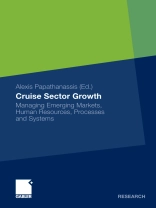Scale is a central theme of the cruise industry. Excessive scale in the ocean liner business gave rise to the birth of cruising in the 1960s. Air travel had gradually replaced ocean travel, and the ships built for scheduled passenger services were put to other uses, such as leisure cruises. For the cruise lines, the achievement of cost-saving scale effects has always been a major driver of business development and innovation. The formation of cruise ship fleets in the 1970s brought down the costs of marketing, distribution, personnel, training, purchasing, and administration per unit of available capacity, leading to a decline in ticket prices and a corresponding surge in the demand for cruises. Since the 1980s, scale effects have increasingly been realised at the level of the individual ship. The launch of large purpose-built cruise vessels reduced unit costs even further and made cruising more comfortable and convenient. Papatheodorou (2006) reminds his readers that for unit cost savings to materialise, the scale of cruise capacity has to be matched by the scale of sales. Therefore, the larger fleets and larger ships were associated with more professional sales management and the implementation of revenue management functions aimed at ensuring the full occupancy of available capacities. Today, however, the fleets and ships of the world’s leading cruise companies, Carnival Corporation and Royal Caribbean Cruises, have reached such dimensions that unit costs have become practically invariant with respect to scale.
Содержание
New trends & innovations.- Onboard Revenue: The secret of the cruise industry’s success?.- Analysis of the Asian cruise industry and its future implementation.- Cruising by old timers: A chance for local and regional development in Europe.- FAT cruise tourism: The shifting tide of experiences.- The future of medical care on cruise ships.- Human resource management & training.- Leadership: Short-term, intercultural and performance-oriented.- The future of Filipino workforce in the cruise sector.- Developments in UK maritime hospitality management.- Game-based learning for cruise management: Taking it to the web.- Information technology & process standardisation.- Online booking in the cruise sector: Determinants of online trust & implications.- Price variation across channels: A case of ex-Southampton port cruises.- Online content mining & its potential for cruise management.- Establishing the need for a standardised rating system for cruise ships.
Об авторе
Prof. Dr. Alexis Papathanassis specializes on Cruise Management and Tourism Information Systems at the Bremerhaven University of Applied Sciences.












